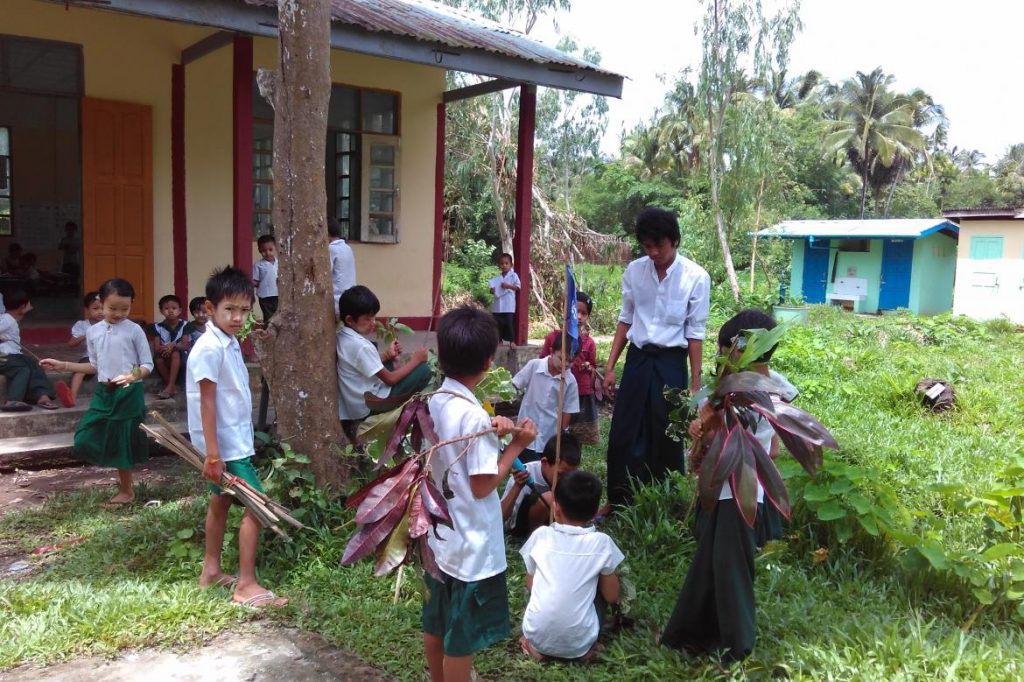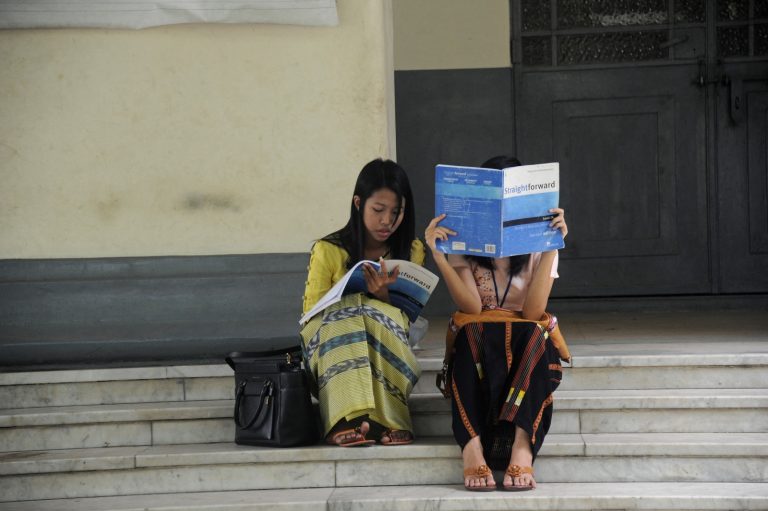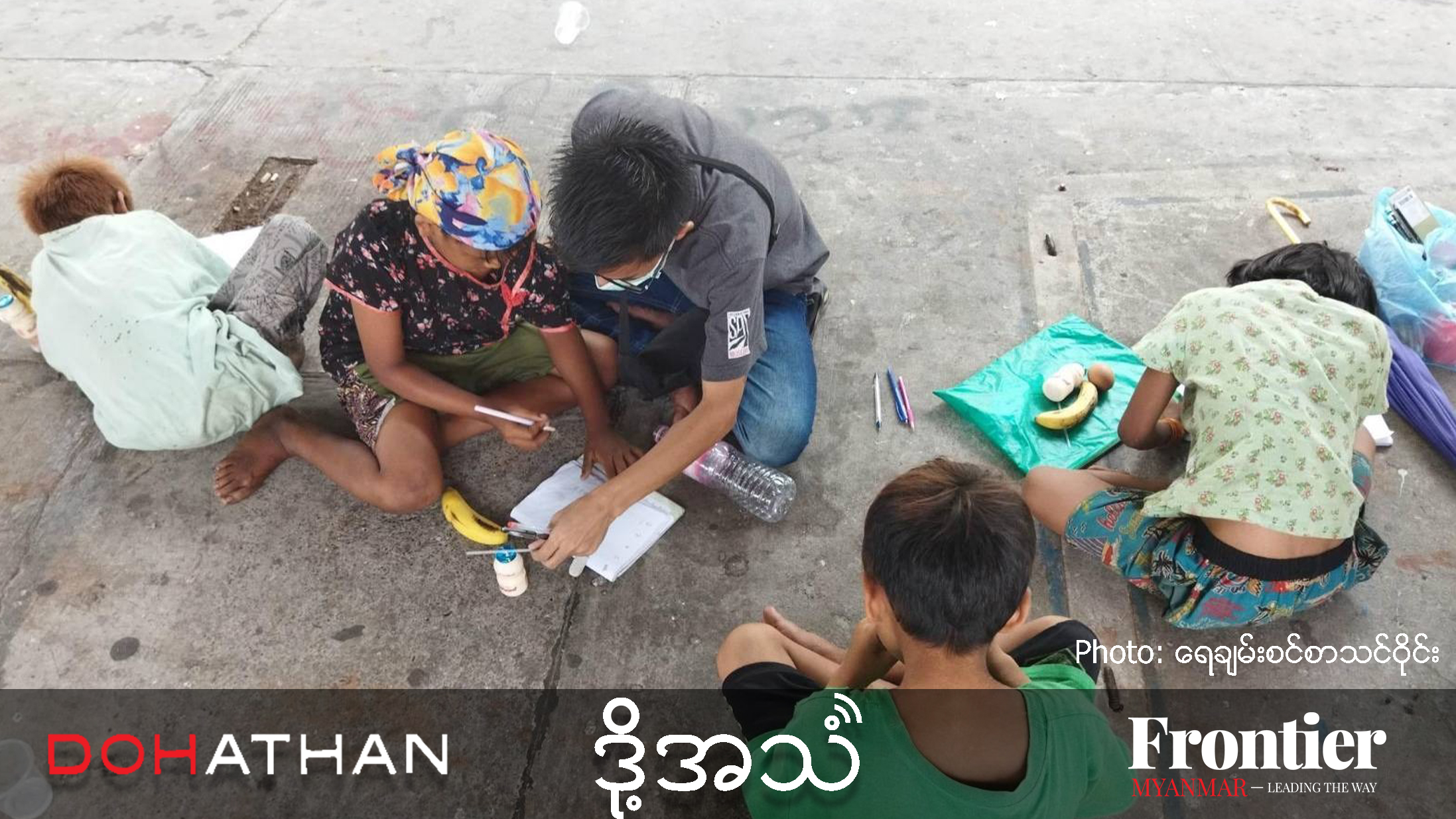A former teacher recalls with affection and nostalgia his stint at a little school in the Ayeyarwady Delta where his pupils stayed away on rainy days because they could not afford an umbrella or a raincoat.
By BO BO THEIN | FRONTIER
BROWSING A newspaper over breakfast one morning recently, my attention was drawn to a headline: “About 300,000 teachers will be given training on the new first grade curriculum”.
The story gave me optimism that Myanmar’s education sector is changing for the better and the students can expect a brighter future. It explained that the curriculum would now be broadened to include subjects such as civics, art and physical education. It also indicated that training for teachers was improving.
As I was reflecting on these thoughts my mind went back to my short stint as a teacher at a school in a small Ayeyarwady Delta village.
As an idle graduate without a job, my auntie was always urging me to find work. But her advice only served as a reminder of my poor prospects. There were no job opportunities for me in the small delta town where I lived, no factories or other big businesses. Many young people found work with the government and I also considered becoming a public servant.
Support more independent journalism like this. Sign up to be a Frontier member.
My auntie suggested I become a teacher because they have some dignity and are regarded with respect, even if they’re unlikely to get rich. I considered the idea. I had tutored my nephew and found the experience rewarding. I decided to apply for a position as a teacher when the next round of vacancies was announced by the Ministry of Education.
A few months later, I received long-awaited news. A teacher friend told me the ministry was advertising for casual teachers, who are paid a daily wage, and I applied for a position. I submitted the application at the education office in Pyapon, a town in the delta about 80 kilometres (50 miles) southwest of Yangon. Pyapon is about 72 kilometres along a bumpy dirt road from the small town where I live and the journey takes about four hours by motorbike. In the rainy season the road turns to mud and is impassable by car.
About a week after submitting the application, I had to sit a written examination. There were three tests: high school-level English and Mathematics, and general knowledge. Two weeks later, I still hadn’t received the results of the examination and started to worry. Rumours were circulating that no budget was available to hire the casual teachers. My hopes began to evaporate.
Then I heard the examination results had been released in Pyapon. In great excitement I asked a friend to find out how I performed and was elated to learn I had passed. So began my life as a primary school teacher at a village in the delta.
Conveniently, the school to which I was assigned was just 15 minutes by motorbike from my town. In the school compound, there was a flat concrete building and a long-legged wooden building, both legacies of the devastation wrought by Cyclone Nargis in 2008. I introduced myself to the headmaster, U San Aung, who welcomed me with a smile.
He explained that the school had five teachers and about 120 students. I was assigned to teach a second grade class.
“You must teach them arithmetic: addition, subtraction, multiplication and division,” San Aung said, adding that my training by the ministry had been deferred because of a dire shortage of teachers. “Training will be provided later and you will become permanent staff,” he said.
There were about 20 pupils in my class, equally divided between boys and girls. I did a roll-call to check attendance, something that had been emphasized by San Aung.
One day all of my pupils were absent, and when I consulted San Aung he said it was because it was raining.
“The parents don’t send their children to school when it rains; most of them are poor and their children do not have an umbrella or a raincoat,” he said.
I made an effort to find out what their parents did for a living. Many foraged for crabs or were wood cutters. Poverty had so stunted the ambition of my pupils that when I asked what they wanted to be when they grew up, many said they wanted to follow their father and be wood cutters or hunt for crabs. I explained the link between cutting timber and environmental degradation, and tried to help them understand the importance of conservation.
That said, I was only paid about K70,000 a month. Sometimes I couldn’t sleep when I was a teacher because I was worried about not having enough to support my family. Because it was not a permanent position I also did not receive holiday pay. I often felt sorry for my elderly father, foster uncle and aunt because my low income prevented me from caring for them as much as I would have liked.
But the innocence of my young pupils helped me to forget my personal problems.
Although I had to teach four main subjects, I also gave classes in moral and civic education outside of school hours. When I taught these subjects I told my class about famous people, such as independence hero Bogyoke Aung San.
I once cited a comment in a letter from Aung San about eating steamed beans and Indian flat bread if they were available, to teach the children to be self content and sympathetic.
San Aung told me that as well as being an educator, a good teacher also needed to cultivate in his or her pupils a desire to work. I put his advice into practice on Fridays, when I made my pupils plant trees.
When I forgot to plant on Fridays, my pupils radiantly reminded me by reciting a motto – planting trees makes our world pleasant, beautiful and green. I was very happy to see that they had taken note of what I said.
A strong attachment gradually developed between my class and I, perhaps because they understood that I wanted to make learning as enjoyable as possible for them.
But my teaching career ended after I was presented with dilemma: with the help of a friend, I received an unexpected opportunity to participate in a journalism course. Making a decision was difficult, mainly because I kept imagining the look on the faces of my pupils when I told them I would be leaving.
But my friend’s encouragement to do the course was also on my mind. “You’re lucky, it’s not easy to be admitted to this course and it’s a great opportunity to improve your life,” he had said. I appreciated his advice because he was aware of the financial strain I had long been under from supporting my elderly father and other relatives. As a journalist I could earn a better income while doing a job that could make a difference to society.
It was a hard decision to make, but I changed my career. My teaching days were over.







